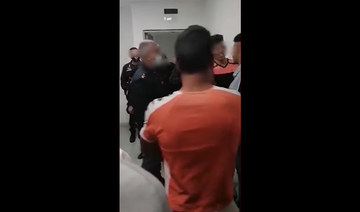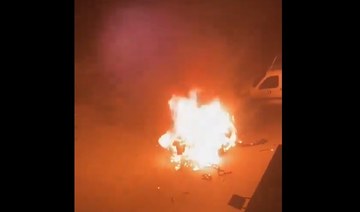BEIRUT: Motorcycle owners in Beirut and the southern suburbs have protested against a security plan launched by the Ministry of Interior in the capital since Monday.
The protests reached their peak with gunfire being exchanged between the protesters and the internal security forces in the heart of the southern suburbs of Beirut.
The situation worsened on Sunday as protesters marched to the Ministry of Interior, claiming that the decision to confiscate unregistered motorcycles was being made randomly and arbitrarily while the vehicle registration office had been closed for years.
Thousands of young men and women have turned to using motorcycles as an alternative to cars since 2019 amid Lebanon’s economic crisis.
The shift has led to a rise in motorcycle thieves targeting people at the entrances of Beirut, particularly on the airport road and highways to the suburbs.
A Lebanese security source said that thieves often seek refuge in Palestinian refugee camps at the entrances of Beirut or in slums in the southern suburbs of Beirut, where illegal weapons are prevalent.
Social media activists shared videos of security forces confiscating motorcycles, while owners claimed the registration service was inaccessible, leading to a lack of registration.
For more than four years, tens of thousands of transactions have accumulated in the vehicle registration department without market licenses, car books, electronic stickers or license plates being issued.
This is due to the crisis of fluctuating exchange rates between the government and contractors — especially contracts in dollars.
In addition to this crisis, corruption investigations are being conducted.
The southern suburbs of Beirut, a stronghold for Hezbollah and the Amal Movement supporters, saw clashes between protesters and security forces on Saturday night.
The supporters held motorcycle rallies to oppose the security plan.
Protesters gathered around the Al-Marija Police Station to chant the message to Interior Minister Bassam Mawlawi that the situation was not under his control.
The Internal Security Forces said that the protesters fired in the air, and the police officers fired in the air to remove them from the site. There was no deaths or injuries among the protesters or the police, as claimed by some social media sites, according to authorities.
The security plan started on May 15, following a meeting of security service leaders 10 days before.
The meeting focused on Beirut’s security due to the increase in pickpocketing, theft, weapon threats and drug trafficking using motorcycles.
The security plan is based on strict measures aimed at maintaining security.
Traffic police units in Beirut and the southern suburbs conduct patrols day and night, with support from various units of the Internal Security Forces, such as the Fuhud forces, the judicial police and others.
Protesters have been blocking main roads with burning tires during afternoon rush hours for days.
Some affected roads include Sports City Road, Mazraa Corniche and the Mar Mikhael-Chiyah intersection.
A political observer expressed concern that “the protest in the heart of the southern suburb of Beirut against one of the state’s police stations may have been carried out with direct cover from Hezbollah, which rejects any disturbance to this environment. Hezbollah maintains a stable security grip in the southern suburb of Beirut while focusing on its war on the southern front against the Israeli army.”
One of the most prominent objections was a statement by the mayor of Ghobeiry, Maan Al-Khalil, who is close to Hezbollah.
The mayor protested against “the confiscation of motorcycles and vehicles belonging to the municipality and driven by municipal employees.”
Beirut MP Nabil Badr said that there was a campaign targeting the interior minister, who is committed to safeguarding the Lebanese people’s safety.
The MP said: “From the start of the security operation, we have urged a comprehensive effort in government agencies, particularly the Car and Motorcycle Registration Department, to help citizens resolve their breaches. The minister has acknowledged the issues and assured that the strict measures will be eased.”
Badr fears that “the campaign aims to create complete chaos in the streets of the capital and its suburbs among those affected by the imposition of security and state prestige. This is something we categorically reject.”
In a statement released on Sunday, the Internal Security Forces rejected “any attacks on their units and members, regardless of the excuses.”
They said that the security plan was requested to protect citizens on public roads from theft, robbery and reckless motorcycle riders, as well as their failure to wear helmets, which has led to an increase in traffic accident deaths.
The security plan aimed to protect people, they said, not to seek revenge or retaliate against them, and, according to authorities, has resulted in a significant decrease in crimes.


























